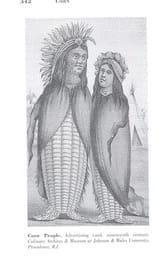>>24530841Corncob has been at various times a sobriquet for three or four different authors on /lit/ over the years.
Originally Thomas Pynchon-perhaps the 'macdaddy of the corncobs'-the phrase appears during a scene with Tyrone Slothrop in Gravity's Rainbow (1973), where his big friend—a figure known as “the Large One”—gets a little bit too physically close to him, gesturing:
>“A finger the size of a corncob, an inch from Slothrop’s nose.”
which was picked up on by early /lit/ posters who appreciated Pynchon's cartoonish exaggeration and intellectual goofiness.
Next came William Faulkner - Because of an unwritten scene in Sanctuary where corncob is the crucial—albeit disturbing—element associated with the character Popeye, who forces another character in the scene using a corncob. Which got picked up by Nabokov who used it to describe Faulkner's 'corncobby chronicles' in a 1967 interview with The Paris Review.
>Dislike him intensely. A writer of corncobby chronicles. And more recently Cormac Mccarthy whose name simply sounds like corncob and got posted that on the template set by Pynchon and Faulkner.
And on at least one occasion Mark Twain's nostalgic and iconic association with 'corncob pipes' has caused him to be referred to by the epithet:
>that old Corncobby an Anonymous poster in 2024.
It can be thought of as being associated with Americans generally. The word “corncob” often evokes rural, frontier, or down-to-earth settings in American literature which can be fairly said to evoke American authors generally. Usage frequently descends from the literal to the symbolic, the symbolic to the purely epithetic, and then back again from the epithetic to the literal (pic related). We can easily imagine a not too distant future where more Americans have than have not been genetically modified into corn vegetables. All you can really do is sit back, strap in, and pray to be spared when the reaper comes. God bless.





